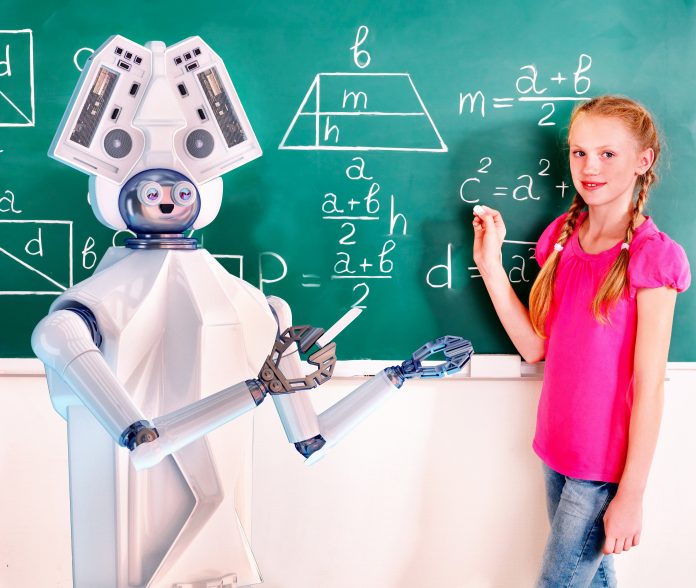Daniel Pitchford, Co-founder, AI Business, discusses how AI and technology are transforming the education sector, in this article
Young people’s screen time is increasing, with the average child spending over two hours a day online. As children become more tech-savvy, there is a huge opportunity to implement certain technologies, such as artificial intelligence (AI), in important areas of their day to day activities – from education to life events.
Even though uptake has been slow, the positives AI can bring to a child’s future and a teacher’s ability to do their job is too far-reaching to ignore, and we’re in the midst of a real period of change and technological advancement.
Alongside the increased use of technology, efforts must be made to improve our nation’s understanding of what can be achieved with machine learning and AI. The UK has a proud history of computing pioneers, such as Alan Turing and Tim Berners-Lee, who developed world-changing technologies, but there are concerns we are no longer keeping pace with global innovation.
Understanding the importance of AI in schooling and providing the correct technology for students and teachers is vital for an outward-looking education system.
Improving the ability to teach
AI is winning over its critics as wider perception is slowly changing as to the positive impact it is and will have on society, it should be seen as a transformative tool that will improve efficiency and ease in the workplace – and beyond. For teachers, technology can help with tasks such as marking students’ work. Currently, it’s a time-consuming, manual process – taking up to 11 hours of extra-curricular time a week – but this will all change once AI systems are implemented.
In the US, Pearson is currently developing and testing an AI marking system to remove this burden from teachers. I predict this will become commonplace in the classroom within a decade, and AI systems will be able to work out where a student’s knowledge gap is and alert the teacher when more time should be spent on specific topics. These improvements will help free up a teacher’s time, streamline their syllabus and provide the opportunity for teachers to focus on what really matters, giving the strongest and best possible education to pupils.
Providing a tailor-made education system
Certain education AI products are starting to use advanced algorithms to analyse a student’s ability. D2L (formerly Desire 2 Learn), a Canadian company, offers personalised teaching to children who want to improve their understanding of a specific subject. This product has already provided a huge number of positives for students who find certain things difficult to learn.
D2L views the education system as lacking in terms of understanding its students. One teacher’s style of teaching can benefit certain students but may not work for others. Having a system that understands, evaluates and delivers tailor-made tutoring will ensure each pupil benefits from its personalisation. The UK is already losing pace with other nations and should look to invest in technology systems at the earliest possible opportunity.
Improving technological education
There is a clear split in the advancement of technology education in the UK – with marked differences between schools and higher education. In primary and secondary schooling, the historic lack of knowledge from teachers has hindered an uptake in students deciding to study computing. In the past year, the number of students studying a GCSE in either computer science or ICT has declined by 10,000 to 130,000, while the number of hours that secondary schools have taught computing has declined by 31%. There are clearly issues the government must address if there is a desire to foster future computer scientists who provide new technological advancements.
Universities are understanding the power artificial intelligence can bring, with many placing funds in new AI centres of excellence over the past years. Recently, the government has invested £110 million to fund artificial intelligence conversion degrees. This is all being done in the hope they will be able to attract top global talent and provide support and the correct technology to nurture students in this field.
As well as university funding in the improvement of AI education, businesses have also been seeing the positives of supporting academia. Companies such as Google’s DeepMind have launched partnerships with universities to offer funding in advanced computing – and further potential understanding in their field.
The offer of high-paid jobs as data scientists or developers after graduating is an attractive opportunity for students considering their career paths. Most importantly, these initiatives are encouraging women into technology and this seems to be trickling down slowly into schools, with the number of girls taking computing in GCSEs rising by 14% in 2019. In offering these opportunities, students, universities and businesses are realising the impact AI education can have on the future of the public and private sector – but this needs to be nurtured from a young age to have maximum impact.
Overall, the UK has a huge opportunity to improve schooling through the implementation of AI. It will help lighten teachers’ workloads, support a personalised education system, and foster talent and interest in homegrown developments in the AI field. There is a concern that as the technology becomes more complicated, fewer school children will be interested in studying computing – and this comes hand in hand with widespread lack of understanding of what the technology does and can do. Even with investments from the government and business in university education, there should be a wider view on how AI education needs to be improved. AI innovation is accelerating at a fast rate, but currently, the UK’s education system is lagging.











